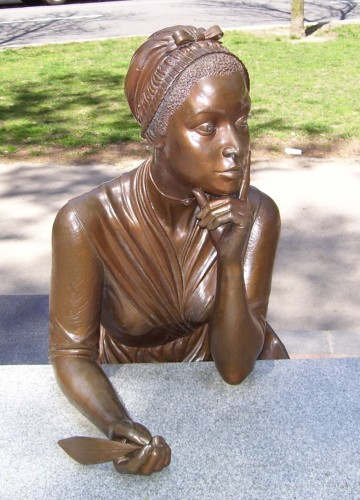
“Twas mercy brought me from my Pagan land, Taught my benighted soul to understand, That there’s a God, that there’s a Saviour too: Once I redemption neither sought nor knew. Some view our sable race with scornful eye, “Their color is a diabolic die.” Remember, Christians, Negroes, black as Cain, May be refin’d, and join th’ angelic train.”
“Through thickest gloom look back, immortal shade, On that confusion which thy death has made.”
—Phillis Wheatley
Born in Senegal about 1753, poet Phillis Wheatley was brought to Boston, Massachusetts, on a slave ship in 1761, and was purchased by John Wheatley as a personal servant to his wife. The Wheatleys educated Phillis, and she soon mastered Latin and Greek, and began writing poetry. She published her first poem at age 12, and her first volume of poetry, Poems on Various Subjects, Religious and Moral, in 1773. She died in Boston in 1784.
A pioneering African-American poet, Phillis Wheatley was born in Senegal around 1753. At the age of 8, she was kidnapped and brought to Boston on a slave ship. Upon her arrival, John Wheatley purchased the young girl as a servant for his wife, Susanna.
Under the family’s direction, Wheatley (who, as was the custom at the time, adopted her master’s last name) was taken under Susanna’s wing. While Wheatley suffered from poor health, her quick intelligence was hard to miss, and as a result, Susanna did not train her to be her servant.
Instead, Wheatley received lessons in theology, English, Latin and Greek. Ancient history was soon folded into the teachings, as were lessons in mythology and literature. Additionally, Wheatley, while still a slave, enjoyed limited restrictions on her life and became a part of the family. At a time when African Americans were discouraged and intimidated from learning how to read and write, Wheatley’s life was an anomaly.
Wheatley wrote her first published poem at age 12. The work, a story about two men who nearly drown at sea, was printed in the Newport Mercury. Other published poems followed, with several also being published, further increasing Wheatley’s fame.
In 1773, Wheatley gained considerable stature when her first and only book of poems, Poems on Various Subjects, Religious and Moral, was published. Susanna Wheatley helped finance its publication. As proof of her authorship, the volume included a preface in which 17 Boston men claimed that she had indeed written the poems in it.
Poems on Various Subjects is a landmark achievement in American history. In publishing it, Wheatley became the first African American and first U.S. slave to publish a book of poems, as well as the third American woman to do so.
Following the publication of her book, Wheatley travelled to London to promote her poems, and received medical treatment for a health ailment that she had been battling.
After her return to Boston, Wheatley’s life changed significantly. While ultimately freed from slavery, she was devastated by the deaths of several Wheatley family members, including Susanna (d. 1774) and John (d. 1778).
In 1778, Wheatley married a free African American from Boston, John Peters, with who she had three children, all of whom died in infancy. Their marriage proved to be a struggle, with the couple battling constant poverty. Ultimately, Wheatley was forced to find work as a maid in a boarding house.
Wheatley did continue to write, but the growing tensions with the British and, ultimately, the Revolutionary War, weakened enthusiasm for her poems. While she contacted various publishers, she was unsuccessful in finding support for a second volume of poetry.
A strong supporter of America’s fight for independence, Wheatley penned several poems in honour of the Continental Army’s commander, George Washington. It’s not certain whether Washington ever read her work.
Phillis Wheatley died in Boston, Massachusetts, on December 5, 1784.









